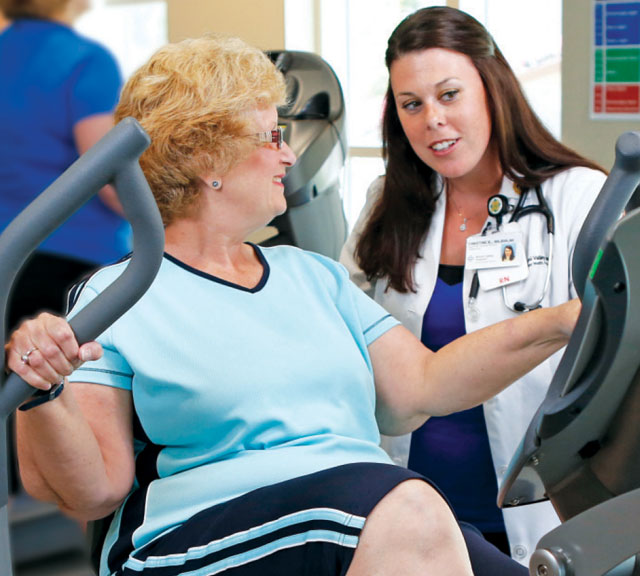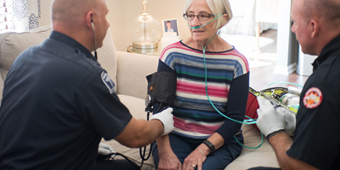What To Expect When You’re Having Open Heart Surgery

Answer a few questions and we'll provide you with a list of primary care providers that best fit your needs.
Heart surgery is performed successfully every day. But when it’s your heart, it’s normal to be concerned. Learning what lies ahead will help ease your worries and get you back on the path to good heart health
Preparing For Open Heart Surgery
Heart surgery corrects problems when other treatments don’t work or can’t be used for some reason. The most common type of heart surgery for adults is coronary artery bypass grafting. In bypass surgery, arteries or veins are removed from elsewhere in your body and grafted to reroute blood around a clogged artery to supply blood to your heart muscle.
Your health care team — which may include surgeons, cardiologists, anesthesiologists, nurses, and therapists — will discuss your operation with you. They’ll welcome your questions.
If your heart surgery is planned, and not an emergency, you’ll meet first with your doctor and health care team. They’ll tell you what to expect and how to prepare. Before your surgery:
- You’ll likely be admitted to the hospital two to three hours before surgery, so the staff can begin preparing you for surgery.
- Your health care team — which may include surgeons, cardiologists, anesthesiologists, nurses, and therapists — will discuss your operation with you. They’ll welcome your questions.
- You may have routine tests, such as an electrocardiogram (ECG or EKG), a chest X-ray, blood tests, carotid ultrasound,and vein mapping, along with an in-depth class on open heart surgery. Testing and the class usually take about four hours and are completed a week before your scheduled surgery.
- A hospital staff member will shave the area where the surgeon will make the incision. Your skin will be washed with antiseptic soap to reduce the risk of infection.
- You won’t be able to eat or drink anything after midnight before your surgery.
- You may have to stop taking certain medicines, like aspirin, that affect how your blood clots.
- Just before your surgery, you’ll be wheeled into the operating room. You’ll be given medicine to help you relax.
During Surgery

Once you’re in the operating room, you’ll be given anesthesia to put you into a deep sleep. You will feel no pain during the procedure and will not remember it. Heart surgery usually takes three to six hours, depending on how complex the operation is. For traditional open-heart surgery:
- A breathing tube will be placed in your lungs through your throat. The tube is connected to a ventilator, which helps you breathe.
- Your surgeon will make an incision down the center of your chest wall. Then she will cut your breastbone and open your rib cage to reach your heart.
- Your surgeon will remove part of a vein from another part of your body – usually in the chest or the leg – to use as the bypass grafts in your heart.
- A heart-lung bypass machine will be connected to your heart. During surgery, the machine will take over your heart’s pumping action, moving blood away from your heart and oxygenating your blood. This allows the surgeon to operate on a heart that is not beating.
- Once the surgery is done, your surgeon will restore blood flow to your heart, get it beating on its own and remove the heart-lung bypass machine.
- Your surgeon will close your breastbone with wires that stay in your body. She then uses stitches or staples to close the incision.
After Surgery
In the hospital: Right after surgery, you’ll be taken to the intensive care unit (ICU) or coronary care unit (CCU). A nurse will be with you, observing and caring for you. Also be aware:
- You’ll have a tube in your mouth and throat to help you breathe. It may be uncomfortable, and you won’t be able to talk. The tube will stay in until you can breathe on your own, usually within a few hours.
- You’ll be hooked up to machines that monitor your heart rate, blood pressure, breathing, and other vital signs.
- You may spend a day or two in the ICU, depending on the type of surgery you had. Then you may be moved to a regular room for several more days of recovery.
At home: Once you’re back in familiar surroundings, recovery will depend on your heart problem and type of surgery. After returning home:
- Keep follow-up appointments with your heart surgeon.
- Return to a regular sleeping routine as soon as possible – and take a rest break mid-morning and in the afternoon.
- Exercise as your doctor advises. You’ll probably tire easily at first, but after a few weeks you’ll start feeling stronger.
- Follow your doctor’s instructions for caring for your incision. Watch for any signs of infection.
Ongoing care: After your surgery, your care will include checkups with your doctor. She may recommend:
- Lifetime follow-up with your cardiologist for ongoing heart monitoring and care.
- Lifestyle changes like eating healthier, exercising more, quitting smoking, and reducing stress
- Cardiac rehab, a medically supervised program to improve your health and well-being
- Blood thinners and medicines to help control your cholesterol and blood pressure medications and other medicines to help the heart function well.
Answer a few questions and we'll provide you with a list of primary care providers that best fit your needs.
Source: American Heart Association; MedlinePlus; NIH: National Heart, Blood and Lung Institute




